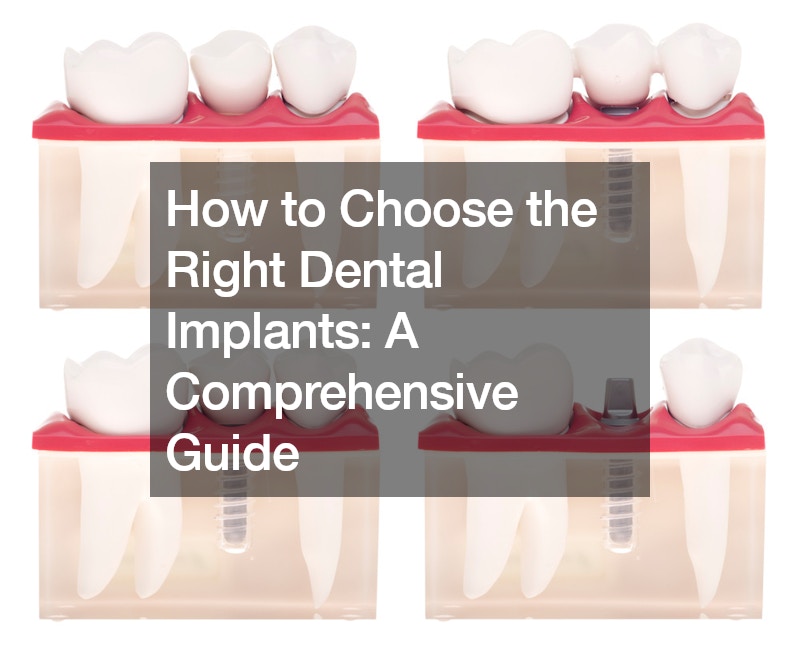

Dental implants have revolutionized the field of dentistry, offering a reliable solution for those with missing teeth or struggling with dentures. However, selecting the right dental implants requires careful consideration of various factors to ensure the best outcome. In this comprehensive guide, we’ll explore everything you need to know to make informed decisions about dental implants.
Understanding Dental Implants:
Dental implants serve as artificial tooth roots, providing a sturdy foundation for replacement teeth. They consist of three main components: the implant fixture, abutment, and crown. The implant fixture is surgically placed into the jawbone, serving as the anchor for the replacement tooth. The abutment connects the implant fixture to the prosthetic tooth, while the crown is the visible part of the implant that resembles a natural tooth.
Who Needs Dental Implants:
Dental implants are suitable for individuals with missing teeth, whether it’s a single tooth, multiple teeth, or a full arch. They are also beneficial for those experiencing difficulties with traditional dentures, such as discomfort, instability, or difficulty chewing. Additionally, dental implants can prevent bone loss in the jaw and preserve facial structure over time.
Types of Dental Implants:
There are various types of dental implants available, each catering to different patient needs and preferences. Endosteal implants are the most common type, surgically placed directly into the jawbone. Subperiosteal implants are positioned on top of the jawbone, underneath the gum tissue, and are suitable for patients with insufficient bone density. Mini dental implants, as mentioned earlier, are smaller in diameter and are often used in cases of thin jaw ridges.
The Implant Process:
The dental implant process typically involves several stages. First, a comprehensive evaluation is conducted to assess the patient’s oral health and determine implant candidacy. This may include dental exams, X-rays, and 3D radiographs to assess bone density and structure. Once deemed suitable, the implant fixture is surgically placed into the jawbone during a minor procedure. After a period of healing, the abutment is attached to the implant fixture, followed by the placement of the crown.
Considerations for Choosing Dental Implants:
When choosing dental implants, several factors should be considered to ensure optimal results. These include:
- Oral Health: Good oral health is essential for successful implant placement and healing. Patients with gum disease or untreated dental issues may require treatment before undergoing implant surgery.
- Bone Density: Sufficient bone density is necessary to support dental implants. In cases of bone loss, bone grafting procedures may be recommended to augment the jawbone.
- Lifestyle and Habits: Patients should consider their lifestyle and habits when choosing dental implants. Factors such as smoking, teeth grinding, and poor oral hygiene can impact implant success and longevity.
- Budget and Insurance Coverage: Dental implants can be a significant investment, so it’s essential to consider budgetary constraints and insurance coverage when exploring treatment options. Some dental insurance plans may cover some of the cost of implants, while others may not.
Benefits of Dental Implants:
: Dental implants provide several benefits compared to conventional tooth replacement methods, including:
- Improved Functionality: Dental implants function and feel like natural teeth, allowing for comfortable chewing and speaking.
- Enhanced Aesthetics: Implants blend seamlessly with the natural teeth, restoring a beautiful smile and boosting confidence.
- Longevity: With proper care, dental implants can last a lifetime, providing a durable and permanent solution for tooth loss.
- Preservation of Oral Health: Unlike bridges or dentures, dental implants stimulate the jawbone, preventing bone loss and preserving facial structure.
Conclusion:
Choosing the right dental implants is a crucial decision that can significantly impact your oral health and quality of life. By understanding the various types of implants, considering individual needs and preferences, and working closely with a qualified dental professional, patients can achieve optimal outcomes. Whether replacing a single tooth or restoring an entire smile, dental implants offer a reliable and long-lasting solution for tooth loss.
In summary, dental implants provide a revolutionary solution for individuals seeking to restore their smiles and oral function. By following this comprehensive guide and consulting with a dental professional, patients can make informed decisions about their implant treatment and enjoy the benefits of a healthy, beautiful smile for years to come.
.



